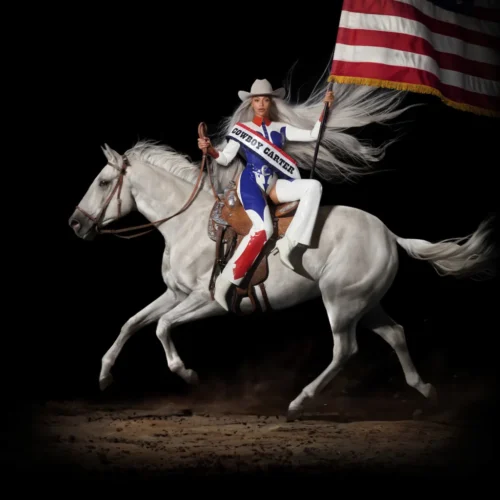I confess that I hesitated to write a review of Cowboy Carter. Because so many others have already done so, and because Queen Bey often leaves me ambivalent. I find her hypersexualization of questionable taste; she embodies, in her own way, the excesses of the American dream, with her financial worth of $800 million, according to Forbes magazine. To which we must add that of her partner Jay-Z.
In my humble opinion, the diva’s music has often been uneven, although commercially profitable and much appreciated. For a long time, I preferred her younger sister, Solange, who was more introspective and musically innovative.
But here’s the thing: Beyoncé has had a huge impact on women and on black communities in the United States… and elsewhere. She symbolizes feminist freedom, unrestrained and the result of a lot of hard work.
It’s worth adding that on the musical front, the lady is becoming increasingly audacious. First with her live album Homecoming at the Coachella Festival (2019), where brass instruments were showcased with innovative arrangements. And then with Renaissance (2022), a sophisticated ode to the world’s dance music.
With Cowboy Carter, Beyoncé played with social networks: she made us believe in the arrival of a country album, which instantly provoked debate in polarized American society. Can a black woman be celebrated by Nashville’s elite and played on country radio stations?
Later, she modified the shot: “This record is not a country album, it’s a Beyoncé record.”
In fact, Cowboy Carter is an album of Americana and soul music, with elements of country. More specifically, it’s a record by a woman who grew up in the Third Ward in Houston, Texas, a middle-class black neighbourhood surrounding the University of Houston, which I had the opportunity to visit. Where its inhabitants were open to all styles of Texas music and culture.
Beyoncé wanted to highlight the black presence in American music, particularly folk and country. A presence that is real: the banjo was invented by black people before being appropriated by white people. Johnny Cash has always said that he grew up listening to gospel music.
Did you know? Cowboy Carter is an excellent opus, despite a few long-winded moments. It’s a carefully crafted concept album, built like an inclusive puzzle and radio show. Above all, Beyoncé’s voice is very authentic, and empathetic. Strong.
It starts with American Requiem, a mix of rock, folk and beats built in collaboration with Jon Batiste. Followed by a harmonized version of The Beatles’ Blackbird, featuring the excellent singers Tanner Adell, Britanny Spencer, Tiera Kennedy and Reyna Roberts.
There are twenty-seven tracks on this opus. We’re not going to describe them all. You can hear Willie Nelson and Dolly Parton, great icons of country music, giving Beyoncé a moral underpinning. She also covers the emblematic song Jolene, giving the text a more feminist touch.
Also rapper Shaboozey, banjoist-composer Rhiannon Giddens, pop singer Miley Cyrus, composer Willie Jones and many others.
You can hear hip-hop, folk, an 18ᵉ century opera aria, a bass that evokes Thundercat, samples from the Beach Boys and Chuck Berry… and country!
Over the past week, Cowboy Carter has become a cultural object dissected at length by every American media outlet. It’s been compared to Stevie Wonder’s Songs In The Key of Life or the Beatles’ Abbey Road. There’s even talk that the album is an attempt to reconcile politically divided Americans through music.
Clearly, Beyoncé has succeeded and will continue to get richer. Could she use this album for more political purposes, in this US election year? For the moment, it’s unclear.
But let’s not deny ourselves: Cowboy Carter is well worth a listen. It’s the second disc in a trilogy. We’re already curious about what’s to come.
























